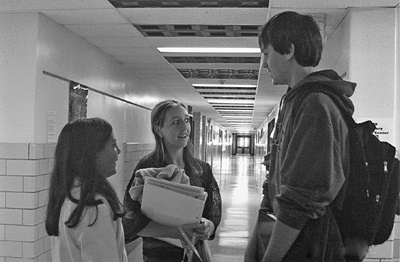All Nonfiction
- Bullying
- Books
- Academic
- Author Interviews
- Celebrity interviews
- College Articles
- College Essays
- Educator of the Year
- Heroes
- Interviews
- Memoir
- Personal Experience
- Sports
- Travel & Culture
All Opinions
- Bullying
- Current Events / Politics
- Discrimination
- Drugs / Alcohol / Smoking
- Entertainment / Celebrities
- Environment
- Love / Relationships
- Movies / Music / TV
- Pop Culture / Trends
- School / College
- Social Issues / Civics
- Spirituality / Religion
- Sports / Hobbies
All Hot Topics
- Bullying
- Community Service
- Environment
- Health
- Letters to the Editor
- Pride & Prejudice
- What Matters
- Back
Summer Guide
- Program Links
- Program Reviews
- Back
College Guide
- College Links
- College Reviews
- College Essays
- College Articles
- Back
Mental Health in Schools
One in five students experience mental health issues, according to the U.S Department of Health and Human Services, and 1 out of 10 young people experience mental health issues so severe that it conflicts with their ability to function properly at home and at school. Due to a lack of access in mental health services, there is an estimated 60% of students who do not receive treatment. Nearly two-thirds of the students who do receive help only do so in school alone. If left untreated, mental health problems can lead to costly negative outcomes such as behavioral and academic issues, as well as dropping out and delinquency. The rates of serious and life-threatening issues, such as self-induced harming and suicidal thoughts, are continuously increasing. According to the Association for Children's Mental Health, "youth with emotional and behavioral disorders have the worst graduation rate of all students with disabilities. Nationally, only 40 percent of students with emotional, behavioral and mental health disorders graduate from high school, compared to the national average of 76 percent; and, Over 50% of students with emotional and behavioral disabilities ages 14 and older, will drop out of high school." With statistics such as those, there has been an increase in concern about students with mental health problems.
Parents, counselors, and teachers alike have continued to decide on methods to aid those with mental health issues, for research shows that students who receive and continuously experience mental-emotional support are more successful in school. The National Association of School Psychologists (NASP) write on their website, "School-employed professionals like school psychologists, school counselors, school social workers, and school nurses know the students, parents, and other staff, which contributes to accessibility of services. In fact, research has shown that students are more likely to seek counseling when services are available in schools". School counselors and psychologists contribute to most school-based services. These people are trained in school system functioning, as well as students’ behavior and mental health and how it affects their capacity to thrive in school. Some students might be eligible for an Individualized Education Program (IEP) in school. This can allow students to have specific routines or practices that cater to their needs and allow them to progress as well as mentally healthy students in their school.
Good mental health is considered, by many, to be essential to academic success. To allow the success and/or graduation rate of students to increase, children and adolescents may require outlets and support from their school's faculty, and without them may find themselves falling behind and suffering from lack of support.

Similar Articles
JOIN THE DISCUSSION
This article has 0 comments.
